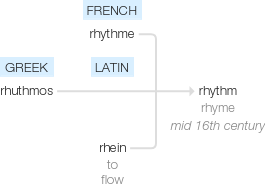Rhythm
mid 16th century (also originally in the sense ‘rhyme’): from French rhythme, or via Latin from Greek rhuthmos (related to rhein ‘to flow’).
wiktionary
First coined in 1557, from Latin rhythmus, from Ancient Greek ῥυθμός(rhuthmós, “any measured flow or movement, symmetry, rhythm”), from ῥέω(rhéō, “I flow, run, stream, gush”).
etymonline
rhythm (n.)
16c. spelling variant or attempted classical correction of Middle English rime "measure, meter, rhythm," also "agreement in end-sounds of words or metrical lines, rhyme; a rhyming poem" (12c.), from Old French rime "verse," from Latin rhythmus "movement in time," from Greek rhythmos "measured flow or movement, rhythm; proportion, symmetry; arrangement, order; form, shape, wise, manner; soul, disposition," related to rhein "to flow" (from PIE root *sreu- "to flow"). Compare rhyme.
The word rhyme has no connection with the word rhythm, nor is rhyme necessary to accentual verse. Nevertheless, rhyme was usually present. On the other hand, in classical Greek metrical poetry, rhymes, if not accidental, were never an essential element of metrical verse structure. [Henry Osborn Taylor, "The Classical Heritage of the Middle Ages," 1911]
The spelling fluctuated 16c.-17c., rithme and ri'me also being used. From 1550s as "metrical movement, movement in time characterized by equality of measures and alteration of stress and relaxation." By 1776 as "regular succession of beats or accents in music."
The rhythm method in reference to birth control is attested from 1936. Rhythm and blues, U.S. music style, is from 1949 (first in Billboard magazine).
